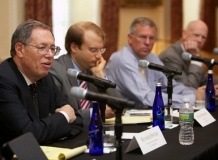On September 20, the daylong conference “The Future of Fannie and Freddie,” co-sponsored by the Classical Liberal Institute and the NYU Journal of Law & Business, featured experts on law, finance, and economics examining the challenges to investment in the government-sponsored entities Fannie Mae and Freddie Mac. Four separate panels focused on the reorganization of Fannie and Freddie, recent litigation surrounding the Treasury Department’s decision to “wind down” the two entities and the legal issues involved, and economic policy and future prospects for Fannie and Freddie in light of proposed House and Senate legislation.
The event also served as the launch of NYU Law’s Classical Liberal Institute (CLI), a new center studying core conceptions of limited government and private property in a wide range of modern contexts including political and corporate governance, taxation, takings, intellectual property, and different forms of regulation. The CLI will host the Hayek Lecture (in cooperation with the NYU Journal of Law & Liberty) in October as well as an ongoing series of student lunches with Law School faculty discussing their work in the CLI’s areas of academic focus. Future CLI conferences are planned, including one in February 2014 on The Classical Liberal Constitution, an upcoming book by Richard Epstein, Laurence A. Tisch Professor of Law and the director of the new institute, who gave opening remarks at the “Future of Fannie and Freddie” conference along with DeanTrevor Morrison.

Panel with Epstein, attorneys Steven Menashi and Randall Guynn, and Judge Arthur Gonzalez (LL.M. ’90)
Epstein also participated in the day’s third panel, “Conservatorship and the Takings Clause.” In his remarks, he focused on whether the 2008 and 2012 reorganizations of Fannie and Freddie, along with other related actions, were contrary to the takings and due process clauses of the Constitution. The key issues he discussed included how to determine solvency when an entity has both positive and negative relationships with the government, whether the fact that the government’s 2008 action was a conservatorship and not a receivership had significant bearing, and how to characterize the government’s deal modification in 2012.
Other conference participants included Barry Adler, Bernard Petrie Professor of Law and Business, and Judge Arthur Gonzalez (LL.M. ’90), a Senior Fellow at the Law School, who served as panelists. Professor Troy McKenzie ’00 moderated a panel on the reorganization of Fannie and Freddie.
Watch Panel 1: The Reorganization of Fannie Mae and Freddie Mac
Adam Badawi, Washington University Law School Anthony Casey, University of Chicago Law School David Skeel, NYU School of Law; Penn Law School Peter Wallison, American Enterprise Institute Troy McKenzie, NYU School of Law (moderator)
Watch Panel 2: Fannie Mae, Freddie Mac, and Administrative Law
Charles Cooper, Cooper & Kirk PLLC Todd Henderson, University of Chicago Law School Troy Paredes, Former SEC Commissioner Mario Rizzo, Department of Economics, NYU (moderator)Watch Panel 3: Conservatorship and the Takings Clause
Barry Adler, NYU School of Law Richard Epstein, NYU School of Law Arthur Gonzalez, NYU School of Law Randall Guynn, David Polk & Wardwell LLP Steven Menashi, NYU School of Law (moderator)Watch Panel 4: The Future of Fannie and Freddie
Mark Calabria, Cato Institute David Reiss, Brooklyn Law School Mark Willis, NYU Law Furman Center Lawrence White, NYU Stern Michael Levine, NYU School of Law (moderator)
Courtesy of NYU Law website.

